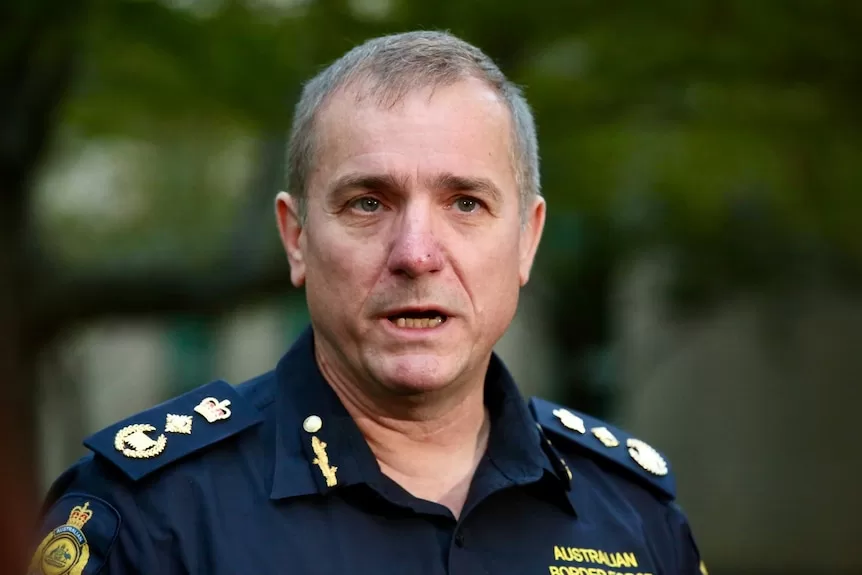- In short: The Human Rights Commission says immediate intervention is needed to fix the Border Force marine unit’s culture of sexism.
- The commission’s review found widespread sexual harassment, and nearly all surveyed women had experienced that directly.
- What’s next? The ABF’s commissioner has committed to changing the organisation’s culture.
A workplace review of the Australian Border Force’s marine unit has found sexual harassment and discrimination is so widespread, “immediate intervention” is needed to make it safe for the women working within it.
A survey of staff within the unit found every woman surveyed had witnessed sexual harassment or discrimination, and nearly all had experienced it directly.
The Australian Human Rights Commission was tasked with looking into the unit as part of a five-year long project investigating workplace culture across the Australian Border Force (ABF).
A summary of a review into the ABF’s marine unit, which has not been released publicly but has been obtained by the ABC, found a “significantly high prevalence” of inappropriate behaviour.
“[The survey] portrays a workplace that is not safe for women and challenges efforts to build a genuinely inclusive culture,” it found.
The marine unit patrols Australian waters, particularly in northern Australia, including surveillance and deterrence operations.
Deployments at sea can be six weeks in length, living in confined and shared environments on vessels, working rosters to cover day and night operations.
The Human Rights Commission’s report found the ABF’s marine workforce is about 90 per cent male, compared to 56 per cent in the ABF more broadly.
There are 555 people within the ABF’s marine workforce.
Just nine women responded to the survey, but two thirds of them had experienced sexist or misogynistic comments, jokes or banter, and roughly half reported intrusive comments about their private life, or sexually suggestive comments or jokes.
Bullying was also found to be widespread — experienced by 78 per cent of women, and 51 percent of men.
The AHRC said while the survey was not a representative sample, the results were consistent with findings in separate focus groups and interviews.
There were some positives, however — including a drift away from an “alpha-male” culture in recent years, to become more inclusive.
Leadership ‘resolutely committed’ to change
The report placed the burden of responsibility for change directly on the ABF’s leadership at all levels — from officers in command on vessels, through to the top of the force.
It said ABF leadership should be held directly accountable for cultural problems, calling for “defined consequences” for leadership failures.
ABF commissioner Michael Outram said the findings from this report, and a second ‘ABF Respect@Work Project’, were not entirely a surprise.
“Given the experience of other similar organisations, it was always likely in undertaking such a review that we would find examples of conduct that has been identified in the reports,” he said.
“The purpose of this work was not just to identify inappropriate conduct, but to analyse the culture of the ABF and provide an evidence-based platform from which we can work.
“I am resolutely committed to working with the AHRC to establish ABF as an exemplar in providing a safe, equitable, diverse and inclusive culture and workplace.”
The marine unit report made 13 recommendations, all of which have been accepted by the ABF.
They include greater accountability among ABF leaders for reported workplace incidents, promotion criteria requiring leadership skills, and flexible working arrangements being offered.
The public sector union’s national secretary Melissa Donnelly said the report’s findings are unsurprising, and a spotlight being thrown on the problem is welcome.
“Our members are relieved to see new leadership no longer turning a blind eye to the issues that plague their workplaces and compromise their safety,” she said.
“All employees deserve to feel safe and respected at work, and all employers have a duty to ensure that is the case.
“Many of these employees work in challenging, remote and isolated circumstances. Moving forward, they need to be confident that they will be supported when raising and dealing with workplace issues, including inappropriate behaviour and workplace sexual harassment.”
Greens senator Larissa Waters said the ABF’s leaders have to ensure the difficult nature of the marine unit’s work doesn’t prevent cultural change.
“The remoteness of the marine unit has allowed an unacceptable culture to develop,” she said.
“The ABF must act immediately to comply with its positive duty and ensure base stations are not hostile work environments.”
